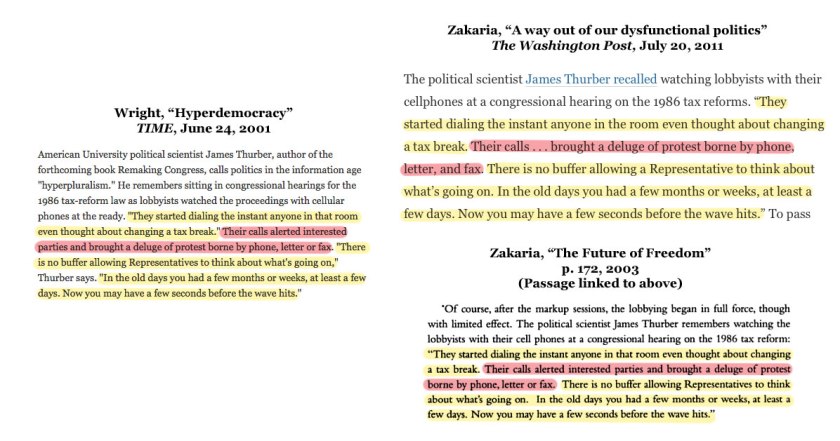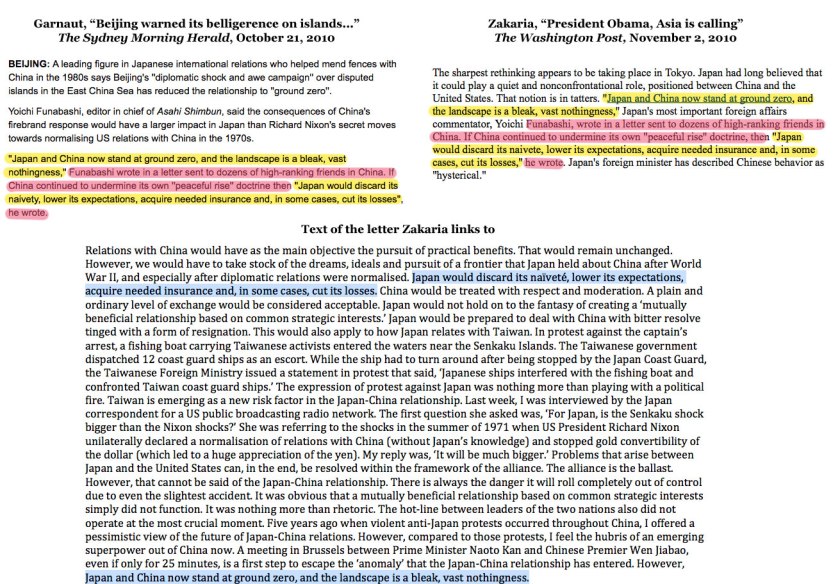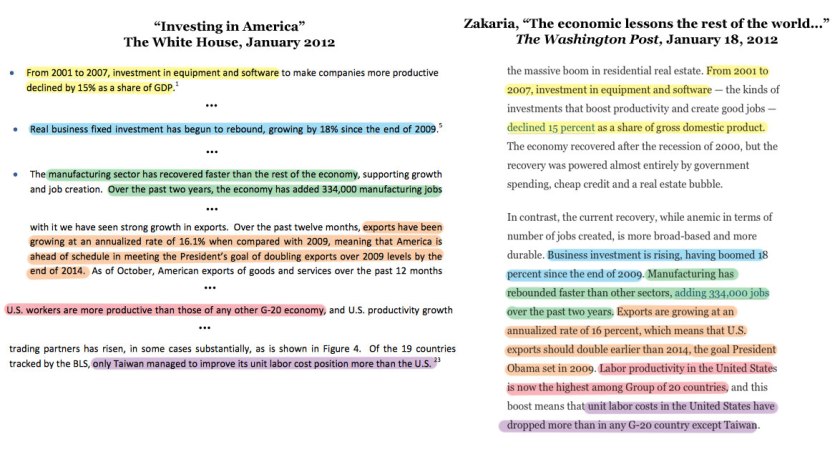UPDATE, 11/10/14, 2:45 PM: BuzzFeed’s Andrew Kaczynski has pointed out that Slate appears to have updated one of Zakaria’s “Wine’s World” columns with an editor’s note regarding plagiarized text. Our story has been updated to reflect this note.
Yesterday on his widely acclaimed Sunday news show, Fareed Zakaria did a segment on a recent international “Index of Ignorance” survey that placed Americans’ ignorance on current issues second to only Italians. Sacre bleu!
This revelation troubled Zakaria deeply. “We all worry about the quality of politicians in today’s democracies. But what about the quality of voters?” he asked. “How can we make decisions about war and peace, expenditures and values if citizens are totally wrong about the basic facts involved?”
Zakaria raises a valid concern: it’s important to any functioning society that voters are informed, not “totally wrong about basic facts involved.” Otherwise, they might go on to host a foreign affairs show under the impression that Syria is a landlocked country or that Egypt and Syria traded flags when nobody was looking. It would be particularly unfortunate if those people, uneducated and unable to understand the consequences of war, flippantly advocated for torture or supported invading Iraq on the basis that “any stirring of the pot is good.” So why don’t more Americans know more about their country and the world they live in? One reason might be because their media is more interested in covering its own ass than covering the issues.
THE ONLY PEOPLE WHO’VE BEEN PUNISHED SO FAR FOR ZAKARIA’S PLAGIARISM ARE THE REPORTERS COVERING IT
That seemed to be confirmed this past Friday when Capital New York reported that Arianna Huffington, editor-in-chief of the Huffington Post, had taken disciplinary action against her own journalists for covering our work on Fareed Zakaria’s plagiarism. The official reason given according to Capital New York was that the writer didn’t reach out to Zakaria for comment. That’s pretty convenient for Zakaria, who has refused to comment on the story to even his own network.
Sources within HuffPo itself, however, say that “punitive actions were only taken after Huffington received complaints from … Zakaria,” and not because of the strict “general editorial standards” of a website that runs stories on 50-Cent agreeing to pee in a fan’s mouth. We’re more inclined to believe HuffPo’s staff’’s version of the story, especially given Huffington’s regular appearances on GPS. And so it stands that as of now, the only people to be punished for Fareed Zakaria’s plagiarism are journalists who made the mistake of reporting on it on his friend’s website.
Luckily we’re not under the same restrictions. After flagging the issue late last September, we submitted more examples of Zakaria’s plagiarism to Newsweek. This Friday, the magazine issued corrections on seven articles (1, 2, 3, 4, 5, 6, and 7) written by Zakaria over the course of a decade that “fail to meet editorial standards” and “borrow extensively” from other works without proper attribution. In other words: plagiarism. It’s worth noting that the last time a journalist got caught plagiarizing in seven different articles, they were fired. Despite the editor-in-chief of Slate Group calling us “J. Edgar Hoover,” Slate appears to have also issued a correction to one of Zakaria’s “Wine’s World” columns with an editor’s note regarding plagiarized text.
So far, Newsweek and Slate are the only outlets that have acknowledged Zakaria’s impropriety. But it doesn’t have to be that way. The Washington Post’s editorial editor Fred Hiatt hasn’t commented further on Zakaria’s plagiarism since calling our initial work “reckless.” But in his defense, that was a few dozen examples ago. For the Post’s benefit, we’ve put together six more examples of Zakaria plagiarizing in their pages. While they’re not all of the examples we found, the passages below should be more than enough for the Washington Post to follow in Newsweek’s footsteps and consider retracting or correcting what is obviously lifted work.
Example #1: Zakaria steals a quote from TIME Magazine – and gets it wrong
On the left, you’ll see a 2001 Time column by Robert Wright on lobbyists that quotes political scientist James Thurber. On the right, you’ll see Zakaria also quoting Thurber in a 2011 column for the Post. The column cites the quote to Zakaria’s 2003 book, The Future of Freedom. Neither of these sources indicate that Zakaria didn’t get the quote himself, but is rather taking it from Wright.
The last time we caught Zakaria touting a quote obtained by another journalist as his own, he denied any wrongdoing. There’s no excuse this time. Here’s why: take a look at the text highlighted in red below. Those are Wright’s words, which Zakaria mistakenly attributes to Thurber.
Example #2: Zakaria copies and pastes from UPI on the ETA in Spain
In this 2004 column, Zakaria copy and pastes an entire UPI report on the ETA in Spain, stopping only to add up the number of attacks and deaths (43+44= 87 bombings; 23+15= 38 killed). “As UPI reported” is really all it would have taken here, but then people wouldn’t know how well-read Fareed Zakaria is on the Basque separatist movement. Here’s why this one is notable – Zakaria committed an identical theft in a Newsweek column. On Friday, Newsweek corrected that article, saying it “borrows extensively from UPI without proper attribution.” So here’s the question: does the Washington Post have the same editorial standards as Newsweek?
Example #3: Zakaria copies 44 words verbatim from Foreign Affairs on the economy
In August 2011, Zakaria wrote a column about job creation that cited (and linked to) a Michael Spence piece in Foreign Affairs. The problem here, though, is that citation is not a pass to copy 50 words, delete 6, and paste them into your article. We’d love to hear Fred Hiatt come up with an excuse for this one beyond, “Golly, I guess he forgot the quotation marks!”
Example #4: Zakaria steals an entire paragraph from the Sydney Morning Herald
In an October 2010 article in the Sydney Morning Herald, John Garnaut cited from a letter written by Yoichi Funabashi, the editor in chief of Asahi Shimbun. The letter, addressed to “high-ranking friends in China,” warned about Beijing doing damage to Japanese-Chinese relations. Garnaut quotes from the letter out-of-sequence. Curiously, a few days later Zakaria would also write on the Funabashi letter, lifting 25 of Garnaut’s words verbatim. Tellingly, Zakaria also uses the exact same out-of-order sequencing and framing as Garnaut. Zakaria links back not to the Garnaut letter, but to Funabashi’s letter. We’ve presented both below.
Example #5: Zakaria just rejumbles a New York Times editorial on Kurds in Iraq
In December 2009, the New York Times wrote an oped about tensions between the Iraqi and Kurdish governments. Three days later Zakaria ran a piece in the Post that has identical ideas similar sentence structure, and slightly different word choice. This is classic patch-writing. If you’ve read Zakaria’s astute observations on the Middle East earlier in this post, you’d be right to doubt his originality here.
Example #6: Plagiarism? Or just acting as the White House stenographer?
In a January 2012 column on this economy of ours, Zakaria links to a White House report/press release entitled “Investing in America,” also released that month. He does so to back up his point that investment in equipment and software dropped 15% as a share of GDP from 2001 to 2007. While he never specifically mentions the White House report in the column, Zakaria then goes on to reprint much of it without attribution. With that sort of stealthy messaging, it’s no wonder the guy gets invited to White House State Dinners.
THE ONLY “RECKLESS” THING HERE IS FRED HIATT’S EDITORIAL STANDARDS
As we said, these aren’t all the examples. But there’s not much wiggle room here. Fred Hiatt’s Washington Post is a Galapagos Island of uniquely disturbing editorial horrors, employing a racist Roman Polanski apologist, a “torture groupie,” and a man who thinks people want to become victims of sexual assault. The very least they could do is demand some sort of citation standard.
Edited for typos.





